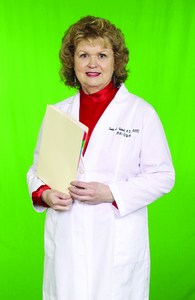

Dr. Lenita Thibault is a singer and once considered being a piano accompanist.
Dr. Lenita Thibault also practices obstetrics and gynecology in Kingsport, Tenn. She has been on the board of directors of the Kingsport Ballet School and Company for more than 15 years and has served on the board for Symphony of the Mountains. She has been a part of Voices of the Mountains and its predecessor, the Kingsport Symphony Chorus. She has also sung in church choirs virtually her whole life.
She began playing the piano at the age of four and studied formally for a number of years. She now has a collection of keyboard instruments, including a modern baby grand piano, two box (square) grand pianos that are antique Steinways (circa 1850-1880s), and a two-manual harpsichord that's a modern reproduction of an 18th century instrument. She also has several other instruments, ranging from a dulcimer, a set of bagpipes that she played before she went to medical school, an old violin that her mother played when she was young, and several smaller items (recorders and small percussion instruments, many of which her mother used when she was teaching music in middle school).
Dr. Thibault played in her high school band and took a number of music courses while an undergraduate at Vanderbilt University. She had enough hours to minor in music, but thought a mathematics major and a music minor might not be the best combination, so she minored in physics instead.
As she grew up, Dr. Thibault says, "I did occasionally flirt with being a professional musician, not as a singer, but as a piano accompanist. However, there were so many things I enjoyed doing that I really didn't want to give up those other interests to devote the time that would be required for music to be my profession. Plus, in all honesty, I don't think I was good enough. And I also had the concern that if I HAD to practice a lot and do it all the time as a living, I might lose some of my love for music, as opposed to being able to choose how much and what I wanted to do with music."
Dr. Thibault didn't have much individual training as a singer but, prior to attending medical school, she learned a great deal while serving as the accompanist for a former opera singer while he gave others voice lessons.
"I'm not sure how I found the time to sing while working in the medical field, but I made the time for it," she says. "Throughout medical school, residency training, and even now, I made/make the time for it because it is important to me. I began doing a lot more singing rather than piano playing because that was easier. A piano isn't always available, and singing doesn't require as much or as intense practicing for me as playing the piano does."
She continues, "It's a wonderful experience being a part of a really good chorus, for a number of reasons. For one, it's personally very satisfying to learn new music, meet people outside the field of medicine, and have the opportunity to perform great music. It's also a way to support and promote the arts. I am convinced that the arts, in all forms, are absolutely essential to the health and vitality of a community. It's a great creative outlet, a way to unwind from the pressures and responsibilities of being a physician. Singing is fun and good exercise - all that deep breathing has to be good for you! I'd have to say that what I enjoy most is getting together with other musicians/artists and making beautiful music which provides enjoyment for us and, we hope, the audience. When it all comes together - well, it's a marvelous experience."
THERE'S MORE